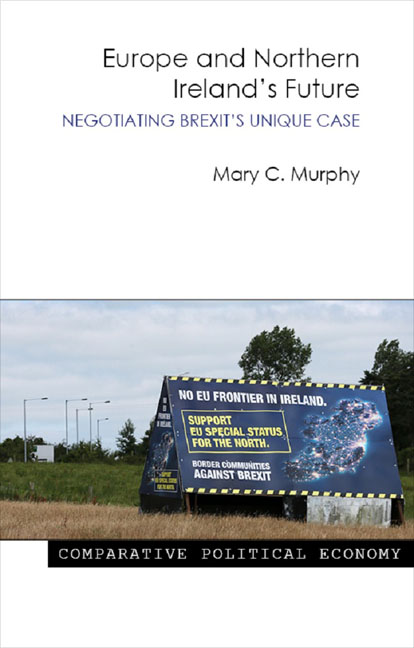Book contents
- Frontmatter
- Dedication
- Contents
- Acknowledgements
- Foreword
- Abbreviations
- 1 The political economy of a pressured relationship
- 2 The politicization of Brexit in Northern Ireland
- 3 When introverted politics and political economy collide
- 4 Who speaks for Northern Ireland?
- 5 Europe and Northern Ireland’s future
- References
- Index
2 - The politicization of Brexit in Northern Ireland
Published online by Cambridge University Press: 16 August 2023
- Frontmatter
- Dedication
- Contents
- Acknowledgements
- Foreword
- Abbreviations
- 1 The political economy of a pressured relationship
- 2 The politicization of Brexit in Northern Ireland
- 3 When introverted politics and political economy collide
- 4 Who speaks for Northern Ireland?
- 5 Europe and Northern Ireland’s future
- References
- Index
Summary
In a European context, George (1998) has labelled the UK “an awkward partner”. This characterization of the UK’s place in Europe is based, to a high degree, on what former Prime Minister Tony Blair described as a history of “hesitation, alienation, incomprehension” (quoted in Watts & Pilkington 2005: 244). The UK chose to opt out of a series of EU policies and developments including the single currency, Schengen, the Charter of Fundamental Rights, and Justice and Home Affairs (JHA) issues. This reflects the unease that EU membership evokes at the national level. UK membership of the EU has long been a contested issue in British politics and has exposed divisions between national political parties, and within those same political parties. The intense divisiveness of the EU issue influenced the creation of a new anti-EU political party, UKIP in 1991. The EU has also sharply divided the national media, interest groups and public opinion in Britain.
Although the two communities in Northern Ireland and their respective political parties have differing perspectives on the merits of European integration, the question of EU membership has not been as contested or as contentious an issue as it has been for the rest of the UK, and for England in particular. The Northern Ireland–EU relationship has a transactional form based on a strong functional character that has included the benefits that come from EU policies and financial assistance. These positive features of Northern Ireland’s EU experience have crossed the communal divide. A relatively harmonious relationship has meant that the EU issue in Northern Ireland was never as politicized as it was for other parts of the UK. In a society like Northern Ireland, where individual and group identity is shaped by attachment to political aspirations and related issues, many political, economic, social and cultural issues tend to evoke strong reactions. Where other constitutional questions, and social and economic policies exposed division between the two communities, the EU was not an area of intense political competition or contestation. In 2016, however, the EU referendum unsettled this state of affairs.
- Type
- Chapter
- Information
- Europe and Northern Ireland's FutureNegotiating Brexit's Unique Case, pp. 19 - 66Publisher: Agenda PublishingPrint publication year: 2018

